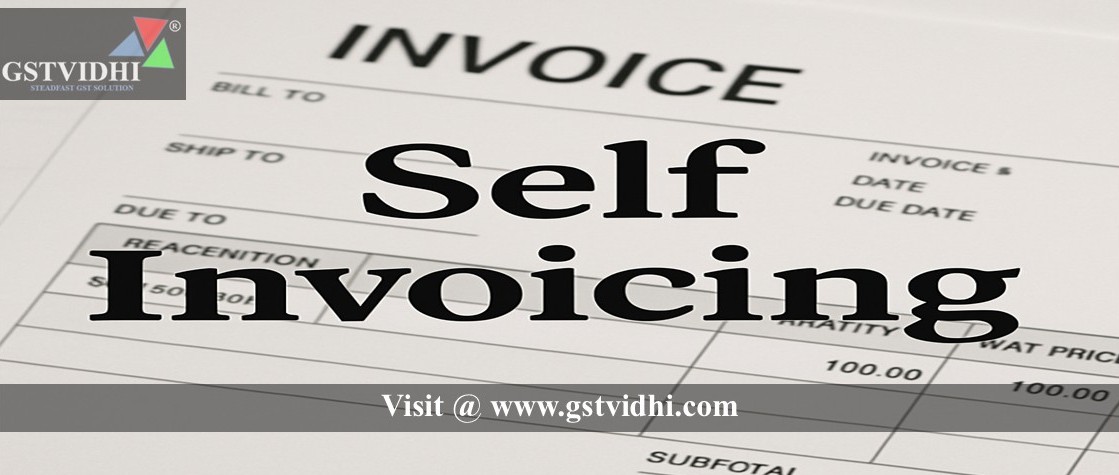
Self-Invoice Requirement Under GST and Penal Consequences for
Non-Compliance
Understanding
the Concept in Simple Words
In the world of GST
(Goods and Services Tax), proper invoicing plays a crucial role in ensuring
transparency and enabling businesses to claim Input Tax Credit (ITC). But what
happens when the supplier of goods or services is unregistered under
GST?
This is where the concept
of 'self-invoicing' comes into play.
What is a
Self-Invoice?
A self-invoice is
a tax invoice that a registered person issues to themselves when they
purchase goods or services from an unregistered supplier. This generally
happens when the transaction is covered under the Reverse Charge Mechanism
(RCM).
Under Section 31(3)(f)
of the CGST Act, 2017, a registered person who receives goods or services from
an unregistered person and is liable to pay tax under RCM, must issue
an invoice on their own. This is called a self-invoice.
Why is it
needed?Because the supplier is not registered, he cannot
issue a GST invoice. Without a proper invoice, the recipient cannot claim ITC,
which is essential for reducing tax liability.
Legal
Provisions Involved
· Section
16(2) – For claiming ITC, a registered person must possess a valid tax invoice.
· Section
31(3)(f) – A registered person must issue an invoice when receiving taxable
goods or services from an unregistered supplier under reverse charge.
· Rule
36 & Rule 46 of CGST Rules – These specify the conditions and contents of a
self-invoice.
What Should
a Self-Invoice Contain?
Rule 46 of the CGST Rules
lists the details that must be included in a self-invoice:
1. Supplier’s
name, address, and GSTIN (if available).
2. Unique
serial number (max 16 characters).
3. Date
of issue.
4. Recipient’s
name, address, and GSTIN.
5. Address
of delivery and State Code (if recipient is unregistered).
6. HSN/SAC
code of goods/services.
7. Description
of goods/services.
8. Quantity
and unit (for goods).
9. Total
value and taxable value.
10. Rate
and amount of GST (CGST, SGST/UTGST, IGST, Cess).
11. Place
of supply and State name (for interstate supply).
12. Delivery
address (if different from place of supply).
13. Mention
of reverse charge applicability.
14. Signature
or digital signature.
15. QR
code with IRN (if issued under e-invoice rules).
Self-invoice is treated
as a valid document to avail ITC under GST.
When Do You
Need to Issue a Self-Invoice?
- You are registered under GST.
- You purchase goods or services
from an unregistered supplier.
- The supply is taxable under RCM.
- You want to claim ITC on that
supply
Contravention:
Rule 56
of the CGST Rules, 2017 states that “Every registered person shall keep and
maintain, in addition to the particulars mentioned in sub-section (1) of
section 35, a true and correct account of the goods or services imported or
exported or of supplies attracting payment of tax on reverse charge along with
the relevant documents, including invoices, bills of supply, delivery challans,
credit notes, debit notes, receipt vouchers, payment vouchers and refund
vouchers.
As per clause (xvi) of
Section 122(1) a taxable person who fails to keep, maintain or retain books of
account and other documents in accordance with the provisions of this Act or
the rules made thereunder; he shall be liable to pay a penalty of ten
thousand rupees under CSGT Act and equivalent penalty of rupees 10000 of SGST
Act.
Example to
Understand
Let’s say Mr. A (a
registered person) hires a legal service from Mr. B (who is unregistered).
Since legal services are covered under RCM:
- Mr. A must pay GST on the
service.
- Mr. A must also issue a
self-invoice for the service received from Mr. B.
- This document allows Mr. A to claim Input
Tax Credit for the GST paid under RCM.
If Mr. A does not issue
this self-invoice, he cannot legally claim ITC, and may also face
penalties.
Conclusion
Self-invoicing under GST
is a critical compliance requirement for transactions under the Reverse
Charge Mechanism. It not only helps in availing ITC lawfully but also
protects you from penalties due to non-maintenance of proper records.
Always ensure your
accounting and tax teams are aware of RCM transactions and issue self-invoices
on time.
Key
Takeaways
- Self-invoice is mandatory when buying
taxable goods/services from unregistered suppliers under RCM.
- Helps in claiming Input Tax Credit
(ITC).
- Must include details as per Rule 46.
- Non-compliance may attract a penalty
of up to ₹20,000.
- Keep proper records as per Rule 56 of
CGST Rules.
Disclaimer: All the Information is based on the notification, circular and order issued by the Govt. authority and judgement delivered by the court or the authority information is strictly for educational purposes and on the basis of our best understanding of laws & not binding on anyone.
Find the Attachment (Press on Click Here )
Click here